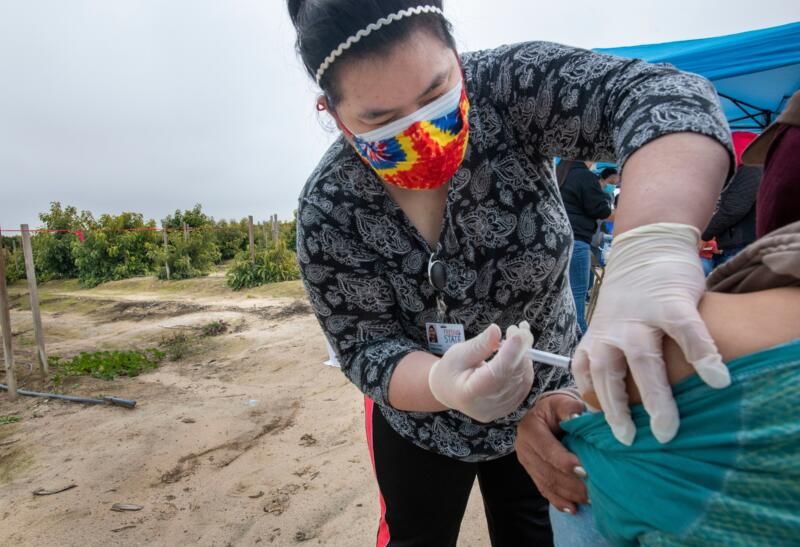State Strives to Vaccinate More Asian American and Pacific Islander Californians as it Ramps Up Equitable Distribution
Sacramento, Calif. – Recognizing the disproportionate impacts COVID-19 has caused in the Asian American and Pacific Islander community, the State of California hosted a panel conversation with state officials, medical professionals and community representatives to discuss the state’s plans for equitable vaccine distribution. As distribution of the COVID-19 vaccine ramps up across California, state officials and medical experts are hopeful about the progress made in the fight against the deadly virus, but they stress that to end this pandemic sooner it is critical for adults to get vaccinated when a shot is made available.
To reflect California’s focus on equity in vaccine distribution, on March 4, Governor Newsom announced that the state has set aside 40 percent of vaccine doses for the hardest-hit communities and established a vaccine equity metric which seeks to increase vaccinations in those communities. With more than 12 percent of Asian American and Pacific Islander (AAPI) Californians already heading the call to get vaccinated when eligible, it is critical to maintain this momentum to help protect lives and stop the spread of COVID-19 in this important community.
“We are laser-focused on expanding efforts statewide, in partnership with our local health advocates, community-based organizations and the broader health system, to provide the COVID vaccine safely, swiftly and equitably,” said Yolanda Richardson, Secretary of the Government Operations Agency who was named by Governor Newsom to assist with operations for vaccine distribution. “Our new statewide vaccine distribution equity standard recognizes and seeks to address the fact that this pandemic does not affect all Californians equally.”
With three vaccines now authorized for use and over 10 million doses administered statewide, vaccines have already made a positive impact. Overall disease trends have improved dramatically over the past six weeks with case rates, test positivity, transmission rate, hospitalizations and ICU admissions are all on a steady decline since the winter surge.
More than 10 million Californians doses have been administered free of charge according to prioritized phases under the Vaccinate All 58 effort encompassing every California county. Those already prioritized for vaccinations, like health care workers, long-term residents, individuals 65 and over, and workers in education, childcare, emergency services and food and agriculture, will continue to be vaccinated as the state expands vaccination eligibility.

Through the new statewide network in partnership with Blue Shield of California, the eligibility standard for the vaccine will move in unison across all 58 counties, ensuring clear statewide standards and prioritizing disproportionately impacted communities. The state will track and analyze who is getting the vaccines to ensure equitable distribution among California’s extremely diverse populations. All individual information collected will be protected and remain private.
Registering on MyTurn.ca.gov, reaching out to your primary care physician or health plan, or contacting a local clinic or pharmacy are a few of the several ways to know when it is your turn to schedule an appointment to be vaccinated. Those without internet or email access can call the COVID-19 Hotline at 1-833-422-4255 (833-4CA-4ALL) to assist with MyTurn registration, which includes an extensive language support center with the ability to add a third party translator for another 250+ languages.
State leaders and public health officials recognize that many Californians may have some skepticism and concerns about getting the COVID-19 vaccine, especially those from historically underrepresented and disproportionality impacted communities. This remains a key priority for the state, and additional communication efforts are being made through local trusted organizations and leaders to educate individuals about the safety of the vaccine and the importance of receiving it when a shot is available.
“We understand the concerns of the AAPI community about the safety of receiving the COVID-19 vaccine,” said Connie Chung Joe, CEO of Asian Americans Advancing Justice – Los Angeles. “The state is working closely with community partners to equitably accelerate vaccine distribution while instilling confidence in the process and making sure our community members know that all of the COVID-19 vaccines are safe and effective. It’s important to remember that we are all in this together.”
Medical expert Dr. Tung Nguyen of University of California San Francisco added that the current COVID-19 vaccines are safe, highly effective and that ethnically inclusive testing of the vaccine showed positive results for all ethnicities and races. As with any other vaccine, mild symptoms are normal and are a sign that the body is building immunity. Some people will not experience side effects at all. Either way, it is important to remember that the vaccines have proven to be safe and effective for all of us.
“Getting my vaccination was an important step for me and my community. Gathering is part of our culture and getting vaccinated will help us beat COVID-19 so we can get together again,” said Audrey Alo, Los Angeles County resident and President of the Pacific Islander Health Partnership. “In the meantime, we have to stay vigilant and protect our community members.”
Information on the state’s equitable phased distribution process can be found at www.covid.ca.gov.


